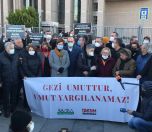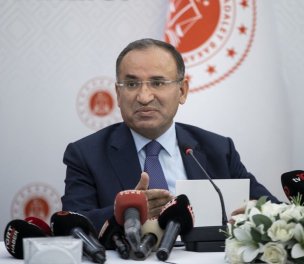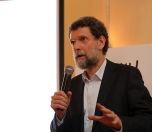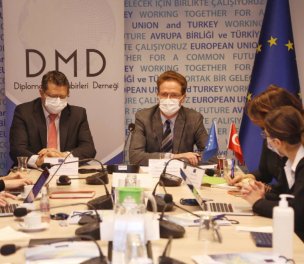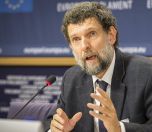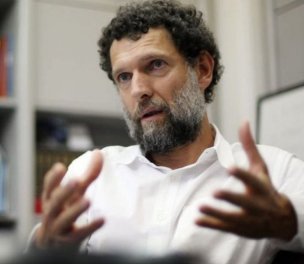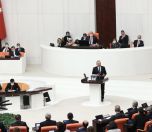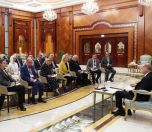Click to read the article in Turkish
Main opposition Republican People's Party (CHP) Parliamentary Group Deputy Chair Özgür Özel met jailed businessperson Osman Kavala in Silivri Prison ahead of his hearing today (January 17).
Commenting on his judicial process during the meeting, Osman Kavala reportedly said, "If the Council of Europe imposes sanctions [infringement proceedings], this will be quite grave for Turkey. I would be ashamed of Turkey being penalized by a council of which it is a founder."
CLICK - CoE to bring infringement proceedings against Turkey
Özgür Özel also said, "All allegations in the indictment against Osman Kavala were refuted one by one; he was released. However, acting in the capacity of a jury chair that did not exist, [President Recep] Tayyip Erdoğan said, 'I don't recognize the ruling' and Kavala was once again unlawfully arrested. The unfair and unlawful arrest must be ended as soon as possible."
Kavala: New court case based on same evidence
In his message from the Silivri Prison in İstanbul via CHP's Özgür Özel, Osman Kavala briefly stated the following:
"The court acquitted me but as I was not acquitted in his mind, a new court case was filed against me based on the same evidence. The indictment says, 'He has intense contact with Henri Barkey, which is evidence of his being a spy.' But it is also said, 'As Barkey is a senior and skilled spy, we cannot concretize this contact. It has been concretized in two places.
"One of them is this: There is a base station on the roof of my office. Barkey also made use of the same base station in the same time frame as me. I was in my office and he was probably walking along İstiklal Avenue. The ones passing along İstiklal Avenue make use of the base station on the roof of my office. This is what is called intense contact.
"The other one is this: It says that a meeting was held abroad to decide who would govern Turkey after the coup. The same indictment says that he was in Germany and I was in France but it is called a contact.
'Only I have remained as a foreign power'
"He cannot say anything to the United States, Russia, Germany or France. There have remained only me and Soros as foreign powers. They were good with both me and Soros. In a state of law, the ones who govern the country cannot make negative statements about the defendant of a court case for at least 10 times. How could it be expected that the court would not be influenced by this process?
"It would be quite grave for Turkey if the Council of Europe imposed sanctions. I would be ashamed of Turkey being penalized by a council of which it is a founder. I would not be content with a decision of sanction. They should not bring it to this point. There is a difference between the attitudes of Erdoğan and [Foreign Minister Mevlüt] Çavuşoğlu about this issue as far as it is reported in the press. The sanctions of the Council of Europe cannot be considered a foreign intervention. It needs to be seen as an intervention of a council that Turkey is a founder of."
Özel: He was arrested upon Erdoğan's words
CHP's Özgür Özel also made a statement about the issue following his meeting with Osman Kavala in Silivri:
"The indictment issued against Osman Kavala was based on the allegations put forward by the FETÖ members [held accountable for the failed coup attempt on July 15, 2016] and these allegations were refuted one by one. Osman Kavala was released. However, acting in the capacity of a jury chair that did not exist, Tayyip Erdoğan said, 'I don't recognize this ruling' and Kavala was unlawfully arrested again upon these words.
"Osman Kavala should not bear the brunt of the unlawful results of Tayyip Erdoğan's lawlessness, no citizen of Turkey should. This prolonged, unfair and unlawful arrest should end as soon as possible.
"Turkey should be a country where the executive power and the person who heads it do not interfere with the law. The Republican People's Party aims to have a country where judges are not directed by political statements but rule based on evidence and their conscience."
A brief summary of Osman Kavala's arrest17 October 2017: Osman Kavala was detained. 1 November 2017: Kavala was ordered arrest on the charges of 'attempting to overthrow the government or to prevent it from exercising its functions' (Article 312 of the TCC) and 'attempting to overthrow the constitutional order through force and violence' (Article 309 of the TCC). 24 December 2018: The investigation files under Article 309 and 312 of the TCC were separated. 19 February 2019: The first indictment against Kavala was issued under Article 312 of the TCC 16 months after he was arrested. 11 October 2019: A release order was issued in favor of Kavala on the charge under Article 309 of the TCC. 10 December 2019: The ECtHR ruled that Kavala's detention constituted a violation of human rights and that he should be released immediately. 18 February 2020: A decision of acquittal was issued in the trial heard under Article 312 of the TCC. 19 February 2020: After the decision of acquittal, Kavala was not released but was arrested again on the charge under Article 309 of the TCC. 9 March 2020: Kavala was ordered arrest under Article 328 of the TCC. 20 March 2020: The second release order was issued in favor of Kavala under Article 309 of the TCC. However, his detention on the charge of espionage under Article 328 of the TCC continued. 3 September 2020: The Committee of Ministers of the Council of Europe, which oversees the execution of the judgments of the ECtHR, ruled that the judgment of the ECtHR should be executed and that Kavala should be released immediately. 29 September 2020: The Constitutional Court of the Republic of Turkey decided to examine the application of Kavala regarding his unlawful detention. However, it postponed the examination as the second indictment including the charges under Articles 309 and 328 (espionage) of the TCC was submitted to the court on the same day. 29 September 2020: In the second meeting in which this matter was discussed, the Committee of Ministers of the Council of Europe ruled that an interim decision should be drafted to be issued in the event that the judgment of the ECtHR is not executed. 3 December 2020: The Committee of Ministers of the Council of Europe issued an interim decision that Kavala should be released immediately and that the Constitutional Court should examine the file in accordance with the judgment of the ECtHR without further delay. 15 December 2020: The Constitutional Court decided to examine the application regarding the unlawful detention and ruled that the file should be referred to the General Assembly of the Constitutional Court. 18 December 2020: The 36th Assize Court ruled that the detention shall continue. The second hearing was scheduled on 5 February. 29 December 2020: The Constitutional Court ruled with 8 to 7 votes that the decision of Kavala did not constitute any violation of right. The reasoned judgment included the strongly dissenting opinions of the judges who voted that the detention constituted a violation of rights. 22 January 2021: The Appellate Court overturned the decision of acquittal in the Gezi trial. It ruled that the file concerning this trial shall be examined together with the files under Articles 309 and 328 of the TCC. 28 January 2021: After the decision of acquittal was overturned, the 30th Assize Court issued a preliminary proceedings report and scheduled the trial concerning the consolidated files on 21 May 2021. 5 February 2021: In the trial heard in the 36th Assize Court, the Court ruled that Kavala's trial shall be consolidated with the Gezi Trial, which will be heard again in the 30th Assize Court under Article 312 of the TCC, and that the detention of Kavala on the charges of espionage under Article 328 of the TCC shall continue. 30 April 2021: As a result of its examination of the detention, the 30th Assize Court ruled that the detention of Kavala shall continue. 12 May 2021: In its weekly meeting of 12 May 2021, the Committee of Ministers of the Council of Europe reviewed Kavala's file and expressed their great concern that Turkish authorities and courts did not take the necessary steps to end Kavala's the continued detention against the judgment of the ECtHR. The Committee urged the member states to bring up the continued detention and immediate release of Kavala during their meetings with Turkish authorities. It pointed out that the detention of Kavala would be reviewed again by the 30th Assize Court on 21 May 2021, and urged the authorities to take all the necessary steps to ensure the release of Kavala. 21 May 2021: At the hearing held by the İstanbul 30th High Criminal Court, the court board ruled that Osman Kavala's arrest on "espionage" charges should continue. The court board also demanded that the Gezi file about the çArşı group should be examined in consideration of a possible merging of the cases and be sent back to the court. 9 June 2021: The Committee of Ministers of the Council of Europe announced that it would bring infringement proceedings against Turkey in the event of Turkey's continued failure to implement the ECtHR ruling on Kavala. It noted that his imprisonment was against international law and Kavala should be released immediately. 28 July 2021: Temporarily appointed as the Presiding Judge of the 13th High Criminal Court during the judicial recess, the Presiding Judge of the İstanbul 30th High Criminal Court, as the Presiding Judge of the local court which had not given consent, gave consent to his own request for merging the cases. 2 August 2021: Even though the İstanbul 30th High Criminal Court was to hold a hearing on August 6, it held a hearing four days before, ruled by a majority of votes that the case should be merged with the ongoing case at the İstanbul 13th High Criminal Court and Osman Kavala's arrest should continue. 17 September 2021: The Committee of Ministers of the Council of Europe decided to wait before imposing sanctions on Turkey over its failure to implement the ECtHR rulings on Osman Kavala and Selahattin Demirtaş, the jailed former Co-Chair of the Peoples' Democratic Party (HDP). It reiterated its call for Kavala's release. 8 October 2021: Following the merging of the Gezi and çArşı cases, the first hearing was held. The İstanbul 13th High Criminal Court did not release Osman Kavala on the grounds of "strong criminal suspicion". One member of the court board expressed a dissenting opinion. None of the requests raised by the lawyers was accepted. In his defense at court, Osman Kavala said, "The continuation of my arrest on lame grounds is extrajudicial execution, it is an attempt to create a perception." 11 October 2021: The European Union Delegation to Turkey recalled that there was no ruling of conviction against Osman Kavala and said that the failure to release him despite the ECtHR ruling is extrajudicial. The Delegation demanded Kavala's immediate release. 18 October 2021: The Embassies of 10 countries (Germany, the United States of America, Denmark, Finland, France, the Netherlands, Sweden, Canada, Norway and New Zealand) called on Turkey to release Osman Kavala immediately. 19 October 2021: The Ministry of Foreign Affairs of Turkey summoned the ambassadors. President and ruling AKP Recep Tayyip Erdoğan and Minister of Interior Süleyman Soylu criminalized Osman Kavala even though he was not convicted and was acquitted before. 22 October 2021: Following the statements of Erdoğan, Kavala said that these remarks left "no possibility for a fair trial", adding, "I believe my participation in the hearings and presenting a defense would be meaningless." 23 October 2021: Erdoğan said that he instructed the Ministry of Foreign Affairs to declare the 10 ambassdors "personae non gratae". 25 October 2021: The ambassadors announced that they maintained compliance with Article 41 of Vienna Convention on Diplomatic Relations. The same day, Erdoğan welcomed these statements. The Court of Cassation and the Board of Judges and Prosecutors also made statements indicating that the judiciary is independent in Turkey. 26 October 2021: Nationalist Movement Party (MHP) Chair Devlet Bahçeli targeted the Constitutional Court through Osman Kavala, who had been behind bars for 4 years, and argued that the top court should be closed. He argued that the ECtHR rulings "became a leverage in the hands of the West. 27 October 2011: Speaking about the infringement proceedings that might be brought against Turkey over the failure to release Osman Kavala, Erdoğan said that "Turkey would go its own way". 2 November 2021: In his fourth year behind bars, Osman Kavala sent a message from prison: "After losing four years of my life and becoming an 'issue of the country', the only aspect I can find solace in is the possibility that the process I experienced could contribute to confronting the crucial problems in the judiciary of Turkey, thus, those who will be brought to justice in the future could receive a fairer treatment." Main opposition CHP Chair Kemal Kılıçdaroğlu also said, "There are Demirtaş and Kavala, who are unjustly held behind bars; this is unacceptable to my conscience." 26 November 2021: The second hearing of the merged çArşı and Gezi cases was held. At the hearing not attended by Osman Kavala, he was not released again. A member of the court board expressed a dissenting opinion to the ruling. 29 November 2021: Osman Kavala said the following about the charges against him: "The most striking characteristic of the espionage charge brought against me after the ECtHR decision to continue my arrest is that it is not based on the description of espionage in the laws." 2 December 2021: The Committee of Ministers of the Council of Europe decided to bring infringement proceedings against Turkey over its failure to implement the ECtHR ruling on Osman Kavala. In response to this, the Ministry of Foreign Affairs said, "Initiating certain mechanisms available under the European Convention of Human Rights, against certain countries based on political considerations rather than legal and equitable criteria undermines, first and foremost the reputation of the Council of Europe." 8 December 2021: Regarding the interim resolutions of the Committee of Ministers of the Council of Europe calling on Turkey to implement the ECtHR rulings on Selahattin Demirtaş and Osman Kavala and to release them immediately, President Erdoğan said, "We don't recognize the decisions taken by the European Union about Kavala, Demirtaş, this or that... This is so simple. We assume that 'they [decisions] do not exist'. In our eyes, these are null and void." |
(TP/SD)
* Source: Evrensel newspaper




.jpg)
